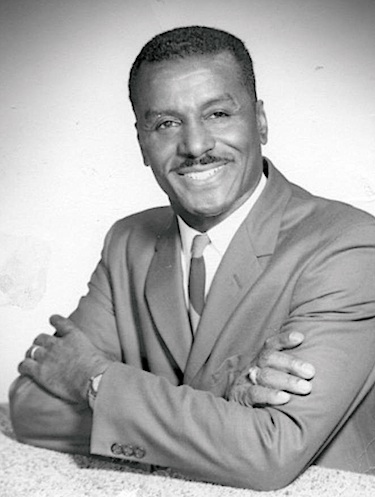 Martin Luther King came to Birmingham in 1963 at the invitation of Reverend Fred L. Shuttlesworth, pastor of Bethel Baptist Church in Collegeville and the local leader of the civil rights movement. Shuttlesworth said the people of Birmingham had prepared for this moment for years and they were ready. Dr. King was welcomed to join them, but Birmingham was going to take on “Bull” Connor and Birmingham City Hall whether Dr. King came or not.
Martin Luther King came to Birmingham in 1963 at the invitation of Reverend Fred L. Shuttlesworth, pastor of Bethel Baptist Church in Collegeville and the local leader of the civil rights movement. Shuttlesworth said the people of Birmingham had prepared for this moment for years and they were ready. Dr. King was welcomed to join them, but Birmingham was going to take on “Bull” Connor and Birmingham City Hall whether Dr. King came or not.
It was not exactly blackmail, but it was close. The style was a perfect example of Shuttlesworth’s approach to civil rights change – activist, aggressive, and nonviolent – in “America’s most segregated city.” King, fresh off a tactical defeat in Albany, Georgia, had little choice. He could either come to Birmingham or risk losing his new-found voice as the spokesman for the civil rights movement in the 1960s. Everyone in America knew that Birmingham would be the major test of King’s nonviolent strategy. If he succeeded in Birmingham, he could succeed anywhere.
King did succeed in Birmingham, and his success lasted until his death by assassination in 1968. Shuttlesworth also succeeded in Birmingham. Ironically, the fiery “Lion of Birmingham,” as Shuttlesworth was called at the time, lived another four decades until he died quietly in bed in Birmingham on October 5 at age 89.
No one in the civil rights movement during the 60s seemed less likely to die in bed of old age than Fred Shuttlesworth. If Shuttlesworth had himself described his own death, he would have called it yet another example of God’s will at work. He had been convinced in 1956, when the parsonage in which he lived was destroyed by a Klansman’s bomb on Christmas Day, that he was God’s anointed. The parsonage was in shambles, the mattress on which he had been sitting was torn apart, glass from the mirror in his bedroom had flown across the room just above his head and stuck like knives in the opposing wall. Yet Shuttlesworth and his family walked out of the rising dust of the ruined parsonage relatively unharmed. To Shuttlesworth, nothing could explain his escape on that Christmas Day except that God had called him to take on the Klan and the injustice of segregated Birmingham. If he did, his actions would be divinely protected.
And so it seems. Shuttlesworth went on to confront segregation fearlessly. The next day in 1956 he led a small group of Negro citizens to sit in the front of a Birmingham bus. Two years later, he was beaten to the ground with chains and brass knuckles when he tried to enroll his children at all-white Phillips High School. His church was bombed again. He met in a strategy session with the Freedom Riders after they were attacked in Birmingham. In 1963, he was knocked off his feet and rolled down the street by the fire hoses during the demonstrations in downtown Birmingham. That fall, he walked with Dwight and Floyd Armstrong, only 9 and 11 at the time, as they became the first black students to desegregate Birmingham’s schools. He was arrested at least thirty-eight times. He taunted “Bull” Connor, calling him up on the phone to announce where he was next going to demonstrate and when. He did everything he could to enrage the entrenched segregationists who governed and controlled Birmingham by law and by force. Yet more than forty years later, he died peacefully in bed. Who is to say that he was not an agent of God’s will?
Dr. King was a powerful writer, an urbane preacher, and a skilled theologian. He was a reluctant activist. He sat down and talked with the forces that were aligned against him. Fred Shuttlesworth was his ally and opposite – a rousing country preacher, a firebrand, a man apparently born into his role as a leader during the Birmingham demonstrations.
History books will record Reverend Shuttlesworth as a fiery and outspoken civil rights activist. What they will miss is that he was also a quiet soft-spoken man devoutly committed to nonviolence, who could sit down and listen intently to both those who agreed with him and those who strongly did not. He loved children. He had a remarkably droll and mischievous sense of humor. That sense of humor will be lost as we canonize him in the history books.
Why did Birmingham succeed when Albany did not? Quite probably, it succeeded because of Fred Shuttlesworth. He was a total and overwhelming strategist who used every method at his disposal. He attacked segregation in the courts, in the mass meetings, in the streets, in strategy sessions with Dr. King and the other SCLC leaders, in the “selective buying” boycott, in the mass arrests, in the creation of the Alabama Christian Movement for Human Rights when the NAACP was outlawed in Alabama, even in sit-down negotiations with Birmingham’s white leadership. His death, even though it came more than four decades after his greatest achievements, is a great loss.
Photo: Courtesy of Birmingham Public Library.
UPDATE, 10.8.2013: An earlier version of this piece included a photo we’d been given recorded verbal and written permission to use in October 2011. The photographer has since asked us to remove it and we’ve chosen to honor her request.
—
Editor’s Note: This remembrance was shared by Wade Black, the executive director of the Birmingham Pledge Foundation. Shuttlesworth in 2000 became the first recipient of the foundation’s Lifetime Achievement Award.







Assuming great things for Fleming, ONB
A month later, we hustled into the conference room at the Young & Vann Building downtown as the city’s Design Review Committee meeting started – beginning a 2 ½ year working relationship as his first hire for Main Street Birmingham (MSB).
I learned a lot while there and had a lot of fun too. We agreed about what needed to be done more often than not; it was often when it came to what we knew we could actually get away with where we’d often differ. The fact I was able to openly disagree with my boss – at least behind closed doors – was something I was extremely grateful for. I was also thankful for the chance to work for someone who truly loved his hometown and wanted to do right by it – a passion that still influences how I approach this website long after my resignation from MSB to launch it in 2007.
When news of Michael Calvert’s retirement and the resulting search for a new president and CEO of Operation New Birmingham (ONB) became public, a part of me just knew David would apply for the job. He did, and earlier today I learned along with everyone else that he’d been offered and accepted the position – effective November 1.
It’s a big day for the future of the city of Birmingham – or at least it is to me. I believe the ONB board sent a clear signal with this decision – one that suggests they value the importance of small business development as a significant part of the revitalization of the city center. It also suggests that while they may recognize Fleming’s familiarity with how things have been done during his previous tour of duty with ONB, they’re willing to listen to someone who may have ideas about how to tweak some of those policies and procedures to better serve small businesses and grow the residential community – both vital to realizing the hopes of many not just in the central business district but the greater downtown area.
These are assumptions – and David’s favorite reminder to me was “never assume.” The thought of just what could happen if some of those changes that could be made to make ONB more effective were applied to MSB initiatives makes me want to assume the best though – for David and the city he enabled me to move to more than seven years ago.
Waiting to see if some of those assumptions become reality will be the hard part…
André Natta is bhamterminal.com‘s stationmaster. He served as senior coordinator for Main Street Birmingham from September 2004 until March 2007.
Photo: David Fleming at North Birmingham ecoscape dedication, October 2010 via archive.
Leave a comment
Posted in leadership
Tagged Commentary, David Fleming, Main Street Birmingham, MSB, ONB, Operation New Birmingham, opinion